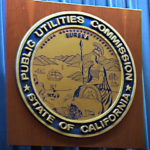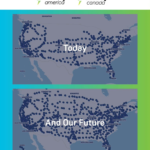The first North American eTaxi Corridor is slated to be built by Better Place in the SF Bay Area, thanks in part to a grant from the California Energy Commission.
On Wednesday, the California Energy Commission announced grants for a total of $20 million worth of clean energy transportation projects. One of those grants is going to a project proposed by Better Place. That project will demonstrate the company’s switchable-battery, electric taxis with an electric taxicab fleet in the SF Bay Area that’s due to launch next year. The project has a surprising subcontractor, Coda Automotive, that will be supplying the electric taxi’s.
The project was originally announced in October 2010, and was to include battery swapping stations in San Francisco and San Jose to support taxi’s traveling the corridor between those two cities. Taxi’s were described at the time as “a high-mileage, high-visibility segment that can serve as the on-ramp for technology transfer to the mass-market.”
However, the SF Bay Area project did not launch this year as originally announced. Better Place spokesperson John Proctor explained that issues arising during “pre-operational planning” delayed the start of the project. Public-private partnership agreements with San Francisco and San Jose were not signed until May 2012, for example. Other planning could not proceed until those agreements had been signed.
An SF Examiner report![]() last week said the project had a $7 million grant available through the Metropolitan Transportation Commission who will manage the regional electric taxi system, that was said to comprise 61 taxi’s in total. The grant announced on Wednesday adds another $3 million to the pot, and Proctor explained there was “significant private funds to be invested.”
last week said the project had a $7 million grant available through the Metropolitan Transportation Commission who will manage the regional electric taxi system, that was said to comprise 61 taxi’s in total. The grant announced on Wednesday adds another $3 million to the pot, and Proctor explained there was “significant private funds to be invested.”
One major issue is a suitable vehicle for use in the U.S. for this project. Better Place has battery swapping operations running in Israel, Denmark and Amsterdam. Because the company is not a car manufacturer, its’ strategy is to partner with automakers who provide compatible cars. The company’s sole partner is Renault, but the Renault Fluence Z.E. is not available in the U.S.
The answer to this question is contained in a contract (#600-12-002) between the Bay Area Air Quality Management District and the California Energy Commission related to the grants announced this week. That contract describes the project scope, namely “BAAQMD will demonstrate zero-emission battery electric taxis with switchable batteries that give the vehicles essentially unlimited range within the area covered by the taxi company. This project will deploy two battery switch stations and 6 battery-switchable electric taxis.” It’s boasted this will be the “first North American eTaxi Corridor” which will offer “unlimited range for participating vehicles” that refill as quickly as a gasoline powered taxi. The goals include demonstrating the service will serve customers at the same rate as gasoline powered taxi’s, with the same downtime, and a lack of range limitations within the corridor.
This amount, 6 taxi’s, is a lot less than 61. Proctor explained that the project will be built in two phases, with the first phase comprising 6 taxi’s.
The contract also included a surprise in the list of subcontractors: Coda Automotive. Coda’s electric car is not designed to be compatible with the Better Place battery switching system. The other subcontractor, FEV Inc, will be re-engineering the Coda electric car to make it compatible with the Better Place system.
This raises a number of questions which Proctor would not answer, and queries to Coda Automotive’s press office were not answered. At the first glance this could simply be a special deal between Coda and Better Place, with nothing further planned. Maybe it indicates Coda is mulling adoption of the Better Place battery switching system. This could be especially useful in 2014 when cars developed in partnership with Great Wall Motors begin world-wide distribution.
Better Place has run an electric taxi demonstration program in Tokyo. The company recently launched an electric taxi service in Amsterdam with a battery swapping station in Schipol Airport. Shai Agassi, Founder and (at the time) Chief Executive Officer, Better Place. “And we’re grateful for the support of the European Commission, the Dutch and Danish governments, Schiphol, Renault, and all of our partners in making this project happen in less than 18 months. We’re determined to demonstrate to Europe that electric cars can drive any distance in any country and aren’t just limited to short-distance driving.”
Better Place’s founder, Shai Agassi, resigned as CEO last week and this week resigned from the Board of Better Place.
Originally published at TorqueNews: http://www.torquenews.com/1075/coda-and-better-place-working-electric-taxi-system-sf-bay-area![]()
- Highway design could decrease death and injury risk, if “we” chose smarter designs - March 28, 2015
- GM really did trademark “range anxiety”, only later to abandon that mark - March 25, 2015
- US Government releases new regulations on hydraulic fracturing, that some call “toothless” - March 20, 2015
- Tesla Motors magic pill to solve range anxiety doesn’t quite instill range confidence - March 19, 2015
- Update on Galena IL oil train – 21 cars involved, which were the supposedly safer CP1232 design - March 7, 2015
- Another oil bomb train – why are they shipping crude oil by train? – Symptoms of fossil fuel addiction - March 6, 2015
- Chevron relinquishes fracking in Romania, as part of broader pull-out from Eastern European fracking operations - February 22, 2015
- Answer anti- electric car articles with truth and pride – truth outshines all distortions - February 19, 2015
- Apple taking big risk on developing a car? Please, Apple, don’t go there! - February 16, 2015
- Toyota, Nissan, Honda working on Japanese fuel cell infrastructure for Japanese government - February 12, 2015














